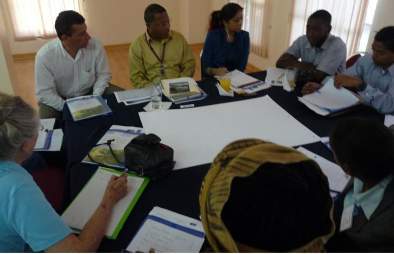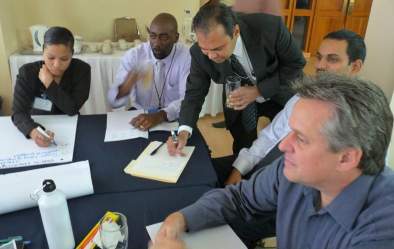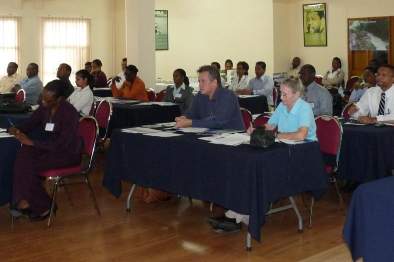Since the IWRM Stakeholder Meetings began on November 25th, 2009, it has maintained its objectives to implement IWRM, facilitate a sustainable water supply, and resolve issues and challenges in the water sector in Trinidad and Tobago.
With the involvement of a wide cross-section of stakeholders in the country, progress has been made in the IWRM Stakeholder Meetings in selecting key IWRM focus areas in relation to the water sector needs of the country. These critical areas include:
- Watershed Management
- Wastewater Standards
- On-Farm Water Management
- Public Education and Awareness
- Information Management
The 8th Meeting provided an opportunity to review the IWRM meetings and activities put on by the WRA and the WASA in 2011. Among those activities highlighted was the national IWRM Media Orientation workshop put on by the WRA, the WASA and the Global Water Partnership-Caribbean (GWP-C) in March 2011 in Trinidad. The workshop helped to educate and sensitise local media practitioners on the importance of reporting on water issues in the country.
In light of the activities undertaken to work towards IWRM implementation in the country, the 8th IWRM Stakeholder Meeting sought to continue to build on these efforts by critically examining the five major IWRM focus areas so that stakeholders could develop projects within them.
Stakeholders were split-up into five sub-groups and were given the choice of deciding which of the five IWRM focus areas they wanted to be a part of and work with throughout the year. The following is an overview of some of the initial project ideas presented by the working groups at the meeting:
Watershed Management
This group discussed potential watershed protection projects and looked at exploring a database collation initiative on watersheds in Trinidad and Tobago. They explained that they would identify relevant stakeholders in the country for information and analyse gaps where the WASA and NGOs have missed.
Wastewater Standards
This group looked at developing potential projects on wastewater re-use and pre-treatment standards.
On-Farm Water Management
The on-farm water management group discussed the need to focus on water for agriculture and pushed the idea that farmers should pay for water. They also pitched the idea of developing communal ponds that could store a large amount of water as a short-term measure on farms. They also placed emphasis on optimising on-site storage.
Public Education and Awareness
This working group explored various project ideas in building greater awareness on IWRM among stakeholders at all levels. Some of the ideas explored included:
- Developing an IWRM/water calendar which would include water facts and information on IWRM.
- Developing a promotional campaign on IWRM and getting a public figure from Trinidad and Tobago to endorse it.
- Going to village/community meetings and sharing knowledge on IWRM with residents.
Information Management
This working group proposed the idea of developing a “National Information Database” on IWRM.


Stakeholders are seen here in sub-groups discussing potential IWRM projects to be implemented this year.
GWP-C’s Regional Coordinator, Ms. Avril Alexander and Communications Officer, Ms. Gabrielle Lee Look participated in the meeting, contributing to the Watershed Management and Public Education and Awareness working groups.
Apart from the constructive working group sessions, stakeholders at the meeting were enlightened about the WASA’s “Adopt a River” project which it aims to fully implement this year. Mr. Wayne Clement, Manager of the Water Resources Agency (WRA) who presented on the initiative, explained that the programme’s main objective is to bring awareness to local watershed issues and to facilitate the participation of public sector entities in sustainable and holistic projects aimed at improving the status of rivers and their watersheds in Trinidad and Tobago.
The “Adopt a River” project when officially launched can seamlessly feed into some of the IWRM projects proposed by the stakeholder working groups as the programme will allow interested stakeholders to choose a watershed and design a project or activity for that river. Within the framework of the programme this can range from community based projects, environmental awareness activities, water quality monitoring projects, among others.
The 8th IWRM Stakeholder Meeting also included presentations from the Environmental Management Authority (EMA) on “Water Quality Standards: The Approach to Developing Water Quality Standards for Trinidad and Tobago” and the Ministry of Energy and Energy Industries on “Building Partnerships, Protecting Our Natural Environment.”
Mr. Wayne Rajkumar from the EMA engaged stakeholders on the need to develop Water Quality Standards (WQS) for the country, looking at the justification of developing them and getting stakeholders’ feedback on the steps to be considered in moving forward with this plan.
Mr. Rajkumar highlighted some of the major responsibilities of the EMA, noting the development of ambient water quality standards and the development and implementation of a Water Pollution and Management Programme. Moreover, he stressed the need to develop WQS for the country stating the following reasons:
- To protect and improve water quality end of pipe quality standards.
- WQS for inland, coastal area waters are generally non-existent but necessary.
Essentially, the EMA representative explained that for the WQS to be developed it would require the support of IWRM stakeholders and other agencies. Stakeholders provided feedback on the WQS plan and interest was expressed in working with the EMA to help them achieve its mandate in protecting the water quality standards in the country.
The other presenter, Mr. Beharry, Director of the Ministry of Energy and Energy industries spoke to stakeholders about the Ministry’s responsibility in the management of Quarry Industry and its expectations of quarry operations.
Stakeholder discussions and efforts towards IWRM implementation in Trinidad and Tobago will continue at the 9th IWRM Stakeholder Meeting scheduled for May 2012.
